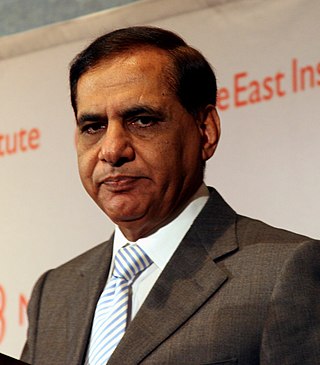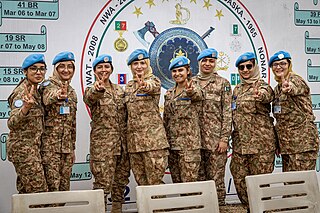
Quaid-i-Azam University Islamabad, founded as University of Islamabad, is a public research university in Islamabad, Pakistan.

The National Security Council is a federal institutional and consultative body chaired by the prime minister of Pakistan as its chairman. The NSC is a principal forum that is mandated for considering national security and foreign policy matters with the senior national security advisers and Cabinet ministers. The idea and inception of National Security Council was first conceived in 1969 under the President Yahya Khan, its functions were to advise and assist the president and prime minister on national security and foreign policies.

Mazar-e-Quaid, also known as Jinnah Mausoleum or the National Mausoleum, is the final resting place of Muhammad Ali Jinnah, the founder of Pakistan. Designed in a 1960s modernist style, it was completed in 1971, and is an iconic symbol of Karachi as well as one of the most popular tourist sites in the city. The mausoleum complex also contains the tomb of Jinnah's sister, Māder-e Millat Fatima Jinnah, as well as those of Liaquat Ali Khan and Nurul Amin, the first and eighth Prime Ministers of Pakistan respectively. The tomb of Sardar Abdur Rab Nishtar, a stalwart of the Muslim League from Peshawar, is also located there.

Major Shaukat Hayat Khan was an influential politician, military officer, and Pakistan Movement activist who played a major role in the organising of the Muslim League in the British-controlled Punjab.
Shaukat Sultan Khan, HI(M), afwc, psc, is a former Director General of the ISPR, the PR wing of the Pakistani Armed Forces. He served from 2003 to 2007.
General Ahsan Saleem HayatNI(M) HI(M) LoM LoH, is a retired senior officer of the Pakistan Army who served as the Vice Chief of Army Staff of the Pakistan Army from 2004 until his retirement in 2007. Prior to that, he served as the operational field commander of the V Corps in Sindh Province and was a full-tenured professor of war studies at the National Defence University. He was succeeded by General Ashfaq Parvez Kayani on 8 October 2007.
Waheed Arshad, HI(M), Tbt, afwc, fsc(t), psc, is a retired three-star general in the Pakistan Army who served as the Chief of General Staff (CGS) at the General Headquarters from 2010 to 2013. His previous appointments at the GHQ include; IG Training and Evaluation (IGT&E), Vice Chief of General Staff (VCGS) and DG Planning at COAS Secretariat. Waheed Arshad also served as the chief Army spokesman heading the Inter Services Public Relations from 2007 to 2008.

Ehsan ul Haq NI(M), HI(M), is a retired four-star rank army general in the Pakistan Army and a public official, served as the 12th Chairman of the Joint Chiefs of Staff Committee, appointed in October 2005 until his retirement in 2007.

The National Defence University (NDU), formerly introduced as Army War Course (1963–70), the National Defence College (1970–2007), is the military university of the Islamic Republic of Pakistan focused on military education and training for the armed forces, including Pakistan military forces and two hundred foreign participants. Formerly established on 28 May 1970 at Rawalpindi, its academic principles are focused on command instructions, national security, military strategy, and war studies among other specified academic disciplines. It is one of the oldest military education and training institutes in the country with additional enrollments reserved for the civil servants.

The Pakistan Meteorological Department (PMD) (Urdu: محکمہ موسمیات پاکستان, also known as Pakistan Met Office), is an autonomous and independent institution tasked with providing weather forecasts and public warnings concerning weather for protection, safety and general information.
Chaklala is a major suburban town of Rawalpindi in the Punjab province of Pakistan.
Raza Muhammad is a retired two-star general of the Pakistan Army, and has served as the High Commissioner of Pakistan to Mauritius. He was concurrently accredited to Republic of Seychelles, Republic of Madagascar and Union of the Comoros. Raza has also been awarded Hilal-i-Imtiaz (Military) for his meritorious services to the Islamic Republic of Pakistan.
He is currently serving as President Islamabad Policy Research Institute (IPRI). Earlier, he was an Advisor to President National Defence University (NDU) from 2019 to 2022. He had also served in Army Welfare Trust (AWT) as an Executive Director(Services).
Muhammad Safdar was the former Governor of Punjab, the largest province of Pakistan, having served from 1999 to 2001. He had previously also served as the Pakistani Ambassador to Morocco and the Vice Chancellor of Punjab University during 1993.

Air Commodore Muhammad Zafar Masud also known as Mitty Masud, was a one star air officer in the Pakistan Air Force and a military strategist who was known for his role as air officer commanding of the Dacca airbase in East Pakistan.
The Full spectrum deterrence (previously known as Minimum Credible Deterrence is the defence and strategic principle on which the atomic weapons programme of Pakistan is based. This doctrine is not a part of the nuclear doctrine, which is designed for the use of the atomic weapons in a full-scale declared war if the conditions of the doctrine are surpassed. Instead, the policy of the Minimum Credible Deterrence falls under minimal deterrence as an inverse to the Mutually Assured Destruction, which is widely regarded as designed to dissuade India from taking any military actions against Pakistan, as it did in 1971. Pakistan has adopted No first use policy, like the other regional powers, India and China, have.

Women in the Pakistan Armed Forces are the female officers who serve in the Pakistan Armed Forces. In 2006, the first women fighter pilot batch joined the combat aerial mission command of PAF. The Pakistan Navy prohibits women from serving in the combat branch. Rather, they are appointed and serve in operations involving military logistics, staff and senior administrative offices, particularly in the regional and central headquarters. There was a rise in the number of women applying for the combat branch of PAF in 2013.

Myanmar–Pakistan relations refers to the bilateral relationship between Myanmar and Pakistan. Myanmar and Pakistan maintain diplomatic and trade relations.

Asif GhafoorHI(M) is a retired three-star ranking general in the Pakistani Army, who most recently served as the president of the National Defence University uptill 2024. Previously, Ghafoor served as the Corps Commander Quetta and the 20th director general of the Inter-Services Public Relations (ISPR).










